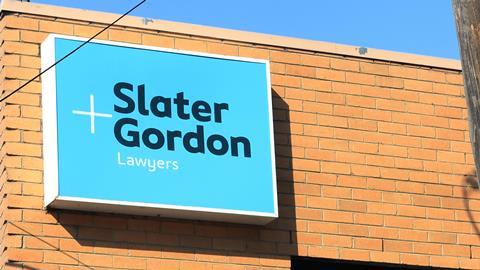National firm Slater and Gordon has declined a judge’s offer to sign a statement of truth that would deny it was the beneficiary of ‘secret’ commissions on ATE insurance.
In an unexpected turn of events in a high-profile costs recovery case, Mr Justice Ritchie today offered the firm the opportunity to commit to the court that there was no fraudulent or rule-breaching element to deductions from clients’ cash account to pay for insurance cover. The firm is contesting a Part 18 application from representatives of its former clients to find out who exactly was paid sums from their cash account.
Given the lunch break to decide, Slater and Gordon’s representative Robert Marven QC returned to say a partner would sign to certify the sums in the client account were correct but would make no further commitment.
Making the statement of truth offer, Ritchie said: ‘There is a huge worry there has been a secret commission in wholly unexplained terms that Slater and Gordon refuses to explain. The allegation is there is a secret commission. How would members of the public feel justice has been done if the cash account is not looked at?’
Marven suggested that the issue was not relevant to the issue before the court, to which Ritchie replied: 'I find it very relevant there has been a commission paid to somebody that is wholly unexplained.'
Marven stressed that no adverse inference should be drawn from Slater and Gordon declining the judge’s offer, and said the firm denies any wrongdoing over ATE payments taken from former personal injury clients.
The court heard that the claimant in Raubenheimer v Slater & Gordon UK Limited made the Part 18 application after evidence emerged about a third party potentially receiving monies deducted from clients’ damages to cover the cost of ATE insurance.
Administrators handling the affairs of collapsed insurer Elite Insurance revealed in an email that the £258 premiums in client agreements included a ‘claims handling commission’ of £30 and ‘claims fund contribution’ of £176. It is the claimant’s case that payments appear to have been made by Elite to Slater and Gordon through a subsidiary but that such payments were not disclosed to the claimant.
Ritchie agreed with Slater and Gordon that an application before a costs judge may not have been the right forum for requesting more information and suggested that the claimant, represented by Clear Legal trading as checkmylegalfees.com, may already have enough information to pursue a breach of fiduciary claim in the chancery division.
Earlier in the joined-up Edwards v Slater and Gordon claim, where 10 test claimants are demanding money back from their former firm, counsel Robin Dunne urged the court to grant them access to audio recordings of their sign-up calls. He said that the one recording which had emerged showed that Slater and Gordon took less than two minutes to ‘e-sign’ a conditional fee agreement with client Ian Turnbull even though he ‘could hardly use a laptop’.
‘There was nothing close to anything that could be described as informed consent [on the Turnbull call],' said Dunne. ‘It would be absurd to expect former clients to put the informed consent point before a court without having access to the sign-up audio.’
Mr Justice Ritchie reserved judgment in both Raubenheimer and Edwards.
The joined-up hearing taking place this week in Edwards and Raubenheimer involved appeals from each side against previous case management decisions.
In Edwards, Slater and Gordon challenges the decision of cost judge Rowley to dismiss applications to have Solicitors Act claims against it stayed or impose security for costs. The firm also appeals the decision to order disclosure of the 10 clients’ sign-up calls.
In Raubenheimer, the claimant is the appellant. He challenges a decision by the same costs judge to dismiss his application to compel Slater and Gordon to answer a Part 18 request for further information about the client account.
Hundreds of other related claims are on hold pending a decision on these appeals. There also remains the shadow of Belsner v CAM Legal, another claim brought by checkmylegalfees but involving a different defendant firm, which is awaiting a re-hearing in the Court of Appeal after the High Court found deductions from client damages had been unlawful without informed consent. Hundreds of thousands of PI claims from the last 10 years could be affected by the outcome of Belsner.



























